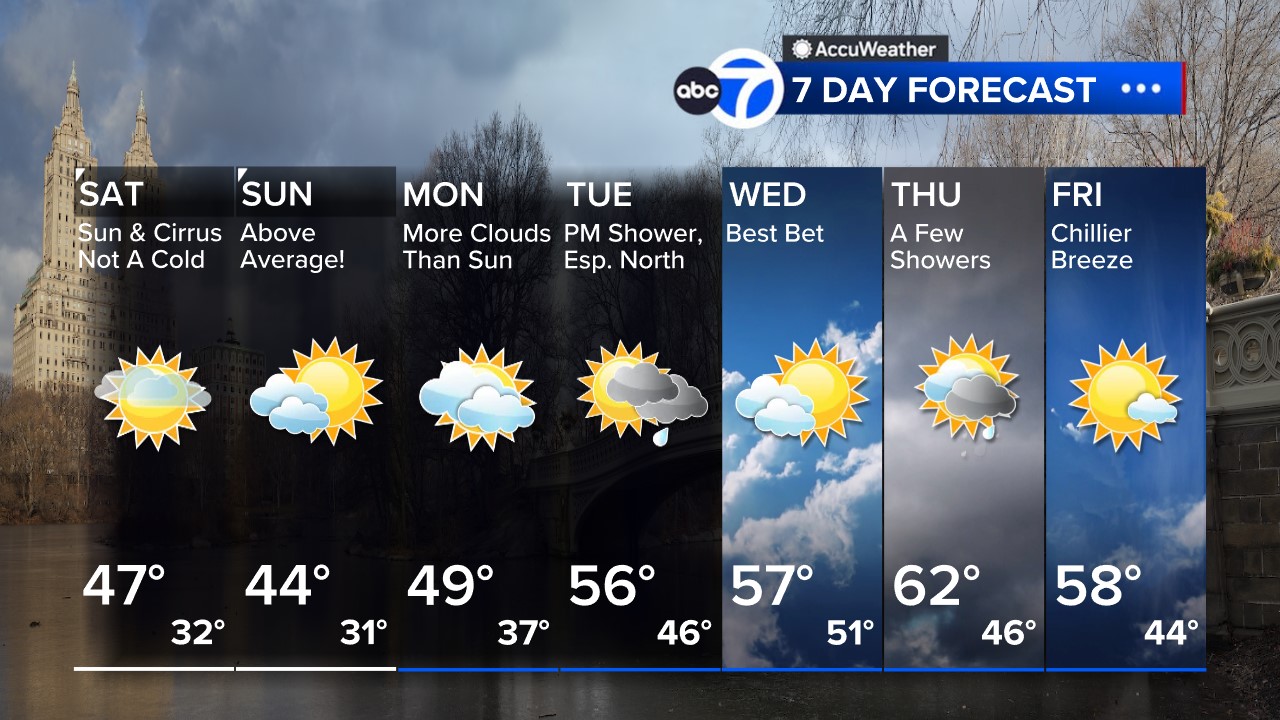Soaking rain, flood threat returns this weekend
AccuWeather forecast for NYC, New York, New Jersey and Connecticut

NEW YORK (WABC) -- Soaking rain and strong winds are set to arrive this weekend, causing a threat of flooding across the area.
The bulk of the storm is set to arrive Saturday night into Sunday. Already, there are a mix of flood alerts, from coastal flood advisories to flood watches and warnings across the metropolitan area. Check our weather alerts page to see your area.
The New York City Emergency Management Department placed New York City under a Travel Advisory, Those who live in coastal areas are urged to remain alert and take action.
Strong offshore winds, in combination with a new moon, will result in higher-than-normal water levels near and along the coast during several high-tide cycles. The worst of which is expected Saturday evening and Sunday morning.
Additionally, as a storm moves through the region, periods of moderate to briefly heavy rain Saturday evening may exacerbate flooding along the shore. Significant inland flooding due to heavy rainfall is not expected, although minor rainfall flooding will be possible in low-lying and poor drainage areas.
NYCEM recommends the following preparedness actions for New Yorkers for those in coastal flood-prone regions and low-lying areas:
Communication and Information: Before and during an emergency, the City will send emergency alerts through various channels, including Notify NYC, available in 13 different languages, with a special sub-group dedicated to Basement Apartment Dwellers. Register at NYC.gov/NotifyNYC or dial 311. Keep a battery-powered radio ready for timely updates, particularly if power outages are expected.
Gather Supplies: Every household member should have a Go Bag packed with essential items, such as bottled water, non-perishable food, and basic medical supplies.
Tidal Awareness and Coastal Barriers: Monitor tide tables and storm surge forecasts. Know when high tides are expected in your vicinity and be prepared to adjust your plans. Where feasible, deploy sandbags or other deployables suitable for a residence to reduce the risk of tidal water intrusion.
Watercraft and Boat Security: If you own boats or watercraft, secure or relocate them immediately. Fluctuating tides can not only carry them away but loose watercraft can cause additional damage.
Storm Drains and Local Warnings: Regularly check and clear any nearby storm drains to help manage water runoff and lessen the chances of localized flooding. Pay attention to localized warnings, especially those pertaining to rip currents and high waves.
Beach Closures and Coastal Roads: Remain updated on any beach closures, as flooding can swiftly make these areas hazardous. Beaches are closed to swimming. Plan alternative travel routes to avoid low-lying coastal roads that may be susceptible to flooding.
Home Safety and Utility Measures: Ensure your home's sump pumps are operational and familiarize yourself with how to safely shut off utilities like gas, water, and electricity. If you reside in a basement or below-grade apartment, be particularly vigilant, as these areas are more susceptible to flooding. Follow City guidance for additional actions specific to below-grade dwellings. Subscribe to Notify NYC's Basement Apartment Dweller subgroup for key alerts.
Document & Insurance Review: Secure essential documents in waterproof containers and maintain digital backups. Review your insurance to ensure you have specialized flood coverage, as standard policies often don't cover flood and wind damage. Consider enrolling in the National Flood Insurance Program. Learn more at www.floodsmart.gov.
Prepare for Outages: To gear up for potential power disruptions, keep your cell phones charged, stock up on supplies. If power outages are predicted, consider adjusting your refrigerator and freezer to colder settings to extend the shelf life of perishable items. Ensure that flashlights and battery-operated radios or TVs are functional, keeping extra batteries on hand. If you rely on Life Sustaining Equipment (LSE) and lose power, dial 911 for immediate assistance, and remember never to use generators indoors. Check on vulnerable individuals in your community, such as older adults and people with disabilities or health conditions, and assist them in their preparations.
Pet Safety: Make provisions for your pets' safety, including the need to leave your home and to take your pet with you.
Plan for Special Needs & Check on Your Neighbors: Make it a point to check on neighbors who are older adults or who may require special assistance. If you have a disability or specific access and functional needs, make sure your emergency plan accounts for how these factors could impact your ability to respond quickly and communicate effectively during a crisis. Seek assistance from your family or service providers as needed.
Avoidance and Caution: Do not venture into flooded areas. These zones may be contaminated or electrically charged. Take preemptive action by assembling a Go Bag with essentials like food, water, and first-aid supplies.
Subscribe to the 'Weather or Not' podcast with Lee Goldberg
Discover more podcasts from Eyewitness News here
NWS Advisories, Watches and Warnings
For weather updates wherever you go, please download the AccuWeather app.
Follow meteorologist Lee Goldberg, Sam Champion, Brittany Bell, Jeff Smith, and Dani Beckstrom on social media.









